Related Topics
Colonial Philadelphia (Pre- 1776)
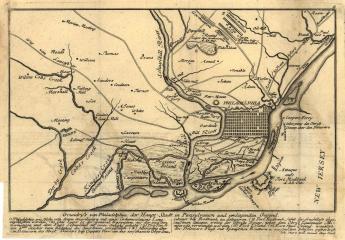 It's surprising to most Americans to learn the American Revolution was not the beginning, but almost half-way through the European settlement. And before the Revolution, there were thousands of years of settlement by non-European tribes. We know more about non-European settlers than we did fifty years ago, but records are still very poor or non-existent, and not likely to catch up very rapidly. History will begin in 1492 for a very long time. Long before that, it isn't history, it's anthropology.
It's surprising to most Americans to learn the American Revolution was not the beginning, but almost half-way through the European settlement. And before the Revolution, there were thousands of years of settlement by non-European tribes. We know more about non-European settlers than we did fifty years ago, but records are still very poor or non-existent, and not likely to catch up very rapidly. History will begin in 1492 for a very long time. Long before that, it isn't history, it's anthropology.
Benjamin Franklin
A collection of Benjamin Franklin tidbits that relate Philadelphia's revolutionary prelate to his moving around the city, the colonies, and the world.
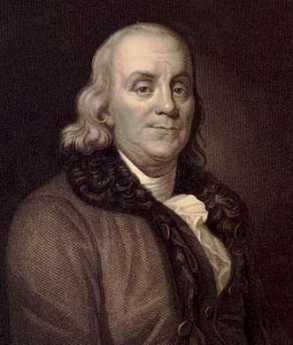
The Park and Beyond: East Falls, Germantown, Mt. Airy and Chestnut Hill
Fairmount Park is large enough to split the City from its suburbs, and is partly a playground, partly a museum. East Falls, Germantown and Chestnut Hill are almost a separate world on the far side of the park.
Philadelphia Medicine
The first hospital, the first medical school, the first medical society, and abundant Civil War casualties, all combined to establish the most important medical center in the country. It's still the second largest industry in the city.
Bystanders to the Revolution
It wasn't heroic to everyone.
Revolutionary Philadelphia's Loyalists
History is written by the victors, so the Tory Loyalists of Revolutionary Philadelphia have mostly fallen from view.
Quakers: All Alike, All Different
Quaker doctrines emerge from the stories they tell about each other.
Quaker Peace Testimony
New topic 2016-12-04 04:05:49 description
Pembertons
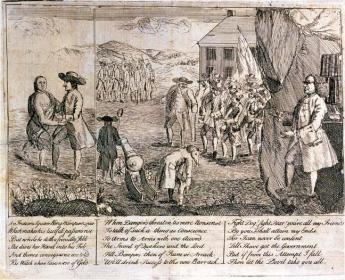
|
| Israel Pemberton, Ben Franklin satire l |
Ralph Pemberton was an English Quaker well before 1650; he may have been a Quaker before William Penn was one. As an old man, he accompanied his son Phineas to Pennsylvania in 1682. They established a farm on the banks of Delaware in Bucks County called Grove Place, and Phineas soon became one of the chief men in the colony. In the next generation, Israel Pemberton became one of the best educated, richest merchants in the colony. But it was Israel's son also called Israel, who earned the title of King of the Quakers. He was one of the founding Managers of the Pennsylvania Hospital along with Benjamin Franklin and one of his brothers, James Pemberton, and was a generous philanthropist and leader of a number of other civic organizations. Just exactly what provoked his famous political disputes with Franklin is not clear, but he was a leading friend of the Indians, whom Franklin never much liked. Israel Pemberton strongly and effectively argued William Penn's policy of friendship with the Indians, particularly insisting that sales of land to colonists should be prevented until there was a clear agreement with the Indians about the ownership. Unfortunately, pressures built up as Europeans immigrated faster than this policy could accommodate smoothly, and Franklin mostly sided with the impatient immigrants -- and squatters. This disagreement came to a head in 1756 when Pemberton negotiated a treaty of peace with the Indians at a conference at Easton. Although this treaty seemed to settle matters, it came against a background of the descendants of William Penn abandoning Quakerism. They, however, remained the proprietary owners of the Province with a more narrow focus on speeding up land sales to maximize their investment. Much of the internal dynamics of these quarrels before the Revolutionary War remain unclear and possibly somewhat misrepresented.
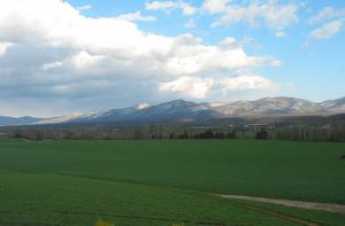
|
| Shenandoah Valley |
When the Revolution came, Pemberton viewed it with disfavor, mostly for pacifist rather than purely Tory reasons. Feelings ran high since the Pembertons were influential citizens with the potential to dissuade wavering neighbors, which made it difficult to tolerate them as invisible bystanders. However that may be, the three Pemberton brothers and twenty other wealthy and influential Quakers were arrested and, without hearing or trial, thrown in the back of an oxcart and sent into exile in Virginia for eight months. Their journey was a curious one, along a trail up the Schuylkill to the ford at Pottstown, and then down the Shenandoah Valley, an area in which they were well known and highly respected, greeted with great sympathy as they traveled. Isaac's brother John, who had spent several years as a missionary, died during this exile.
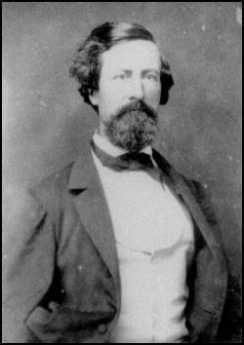
|
| John Clifford Pemberton |
In some ways, the most curiously notable Pemberton was John Clifford Pemberton, who applied to West Point on his own initiative and was appointed by Andrew Jackson who had been a friend of his father. In itself, it is curious that so combative a person and so vigorous an enemy of the Indians -- as Jackson certainly was -- would have Quaker friendships. But he did not misjudge John Clifford, who became a diligent professional warrior for his country in a number of military incidents with the Indians, the Mexicans, and the Canadians, rising to the rank of captain in the regular Army at the opening of the Civil War. In spite of personal efforts by General Winfield Scott to dissuade him, he resigned his commission and volunteered in the Confederate army. He was quickly promoted to major, then a brigadier general and eventually to Lieutenant General. As such, he was the commanding Confederate officer at the fifty-day siege of Vicksburg where he was finally forced to surrender to Grant's army. In a prisoner exchange, he was returned to the Confederate side, which they had no openings for Lieutenant Generals. He resigned and re-enlisted as a common soldier, but was quickly promoted to the rank of Colonel, in charge of the artillery at the final siege of Richmond. After the war, he became a farmer in Warrenton, Virginia, but was visiting at the family home in Penllyn when he died in 1881. John Clifford Pemberton, the highest-ranking general on the grounds, lies buried in Laurel Hill cemetery right next to Israel Pemberton. In some sort of triumph of the South, he here out-ranks George Gordon Meade, the hero of Gettysburg. Just how his pacifist family reconciled itself to his heroism can only be imagined.
Originally published: Thursday, August 31, 2006; most-recently modified: Friday, September 20, 2019
| Posted by: Michael Farrell | Jul 5, 2017 2:41 PM |
| Posted by: Ned | Apr 4, 2014 11:34 PM |